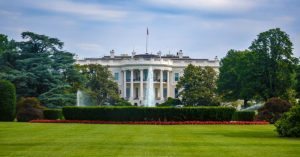 The United States of America was built on Judeo-Christian principles, with the Ten Commandments and the tenets of the Bible as the basis for its laws. The newly-born nation eschewed tyranny, creating a constitution of checks and balances to control governmental power. It also refused to embrace Old World struggles—such as that of Christian against Jew—as part of its culture. The fledgling government took literally the verse of Scripture, “Old things are passed away; behold, all things are become new” (2 Corinthians 5:17). From this admonition sprang the idea of “separation between church and state”—that all faiths would have the right to the freedom of religious gathering, worship, and expression. Moreover, the state would not dictate what church to attend, nor would it silence anyone from expressing their faith in public office or in the halls of government.
The United States of America was built on Judeo-Christian principles, with the Ten Commandments and the tenets of the Bible as the basis for its laws. The newly-born nation eschewed tyranny, creating a constitution of checks and balances to control governmental power. It also refused to embrace Old World struggles—such as that of Christian against Jew—as part of its culture. The fledgling government took literally the verse of Scripture, “Old things are passed away; behold, all things are become new” (2 Corinthians 5:17). From this admonition sprang the idea of “separation between church and state”—that all faiths would have the right to the freedom of religious gathering, worship, and expression. Moreover, the state would not dictate what church to attend, nor would it silence anyone from expressing their faith in public office or in the halls of government.
The founding fathers saw no conflict between these freedoms and openly expressing their religious beliefs, whether going about their daily business as citizens or civic leaders. The American government was not formulated to sanction oppression of any kind. With regard to religion, the government was not to be amoral or secular as some seem to think today; rather, governance was to be based upon the Judeo-Christian virtues of love and prayer: to love and pray for others instead of trying to force them to change.
As early settlers continued to make their way to the colonies from Great Britain so, too, did people from other countries. Among them were the first Jews to reach North America. They set foot on Manhattan Island in September 1654. The four men, six women, and thirteen children had sailed from Brazil aboard a leaking and filthy French ship rampant with disease. It was a miracle any survived the difficult journey. When the Jews arrived in the new colonies, they proved to be a conundrum for their neighbors. They were a people without a homeland, wanderers—often unwelcome—in whatever land they chose to settle. The Jewish immigrants were by nature a close-knit group, and their commonality was often viewed as being conspiratorial.
In 1790, the first census was taken of the thirteen colonies of the United States. The total population was nearly four million, and approximately 2,000 were Jews. George Washington wrote a letter to the Sephardic congregation of Newport, Rhode Island, in August of 1790, and thanked them for the contributions of the Jewish people in the fight for independence:
May the children of the stock of Abraham who dwell in the land continue to merit and enjoy the goodwill of the other inhabitants. While everyone shall sit safely under his own vine and fig-tree and there shall be none to make him afraid.
The second president of the United States, John Adams, had an equal admiration for the People of the Book. Near the end of his life, Adams expressed, “For I really wish the Jews again in Judea an independent nation.” This became a slogan among early Jewish nationalists.
Then later, it is quite possible that an incident of 1840 opened the American ear—that of both Jew and Christian—to the need for Hebrew people worldwide to have a homeland within whose borders they could finally find security from persecution. What had brought the affair to the attention of President Martin Van Buren and his Secretary of State John Forsyth was a dispatch from the American consul in Beirut describing the massacre of Jewish men, women, and children in Damascus. Jews there had been accused of ritual murder in order to obtain the blood of Christians for use in their Passover services—the old and ever-present charge of “blood libel.” (This false accusation has been revived in Islamic nations today.) While the issue was undeniably a gross violation of basic human rights, the end result was that it placed the United States unequivocally and officially on the side of the Jews, forcing the nation to, through formal diplomatic channels, support the Jews for the first time in its history.
Thus, a little more than a century before Israel’s rebirth, the groundwork was being laid in the American conscience for its support of and relationship with the nation of Israel. The call had begun for America to become an international ambassador in helping the Jews reestablish a land and a state for themselves. Over the next century, almost every American president would be faced with the issue of being part of or ignoring the prophecies stating that the people of Israel would return to the Land and form their own government. Unfortunately, however, these same presidents, on the advice of the State Department and because of the pressures of their own times, would take no action to answer this cry until after World War II.
Virtually every American president has in some way been impacted by the Jewish people. From George Washington to Donald Trump, leaders have faced navigating the murky waters of foreign policy and what America’s role should be in world affairs—and in recent years how foreign policy relates to Israel. This will not change with future presidents. Domestic conscience has directed and will continue to direct how America will account for its stewardship of the power entrusted to it, particularly with regard to Israel. There have been times that sluggishness in responding to that call and taking the appointed place of leadership has caused the loss of lives, much pain, and not a little consternation.
Today, Israel is the closest ally the United States has in the Middle East, though that claim may be argued in light of recent governmental action—or inaction. While the reborn Jewish state seeks succor from its big brother for military support and political assistance, as well as financial aid, the United States has benefited equally. Israel has offered staunch support against the enemies of democracy in the region, shared outstanding industrial advances, and succeeded in areas of research and development that have benefited the United States as well.





